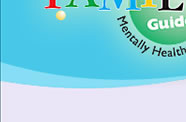Looking for a card you can print? Click here to personalize and print a message for your child. |
The Family Guide Web site features articles and resources about sending children back to school. Whether your children are starting second grade or senior year, you'll find information to keep them mentally healthy and drug free.
Recognizing and Treating Attention Deficit Disorder
Kevin twists and fidgets as he tries to work on his homework. Unable to find
his assignment sheet in his messy binder, he leaps up and begins to bounce
off the sofa and chairs. His mother demands that he stop before he breaks something.
He doesn't look at his mother, or even seem to hear her. Both Kevin and his
mother are frustrated by this familiar battle. But Mom has another worry. Is
her son just a very active boy or does he have attention deficit disorder (ADD)?
Show Your Kids Your Best Back-to-School Behavior
Beep beep beep. The ringing of your child’s alarm clock signals that a
new school year has arrived. It’s time to prepare your child for waking
up to that alarm and getting out his pencils and books. To help your kids rebound
from the lazy days of summer, show them how to get ready for school. Although
children are taught from lesson plans at school, they also learn from the examples
that parents set at home. You are your child’s first teacher, so get ready
to lead a lesson about back-to-school routines.
Back-to-School Blues
The return to school can be stressful for many students, no matter their
age. They worry about making friends, getting a good teacher, and finding
their
way around a new building. But starting the new school year may be harder
for some students than others. Last year, if your child had poor grades,
struggled
with homework, or was unhappy in school, he may not be thrilled about the
coming school year. If your child is starting a new school, she might be
feeling especially
nervous.
Help With Homework
As a parent, it's important for you to be involved in your child's education,
and one way to do that is to help your child with homework. This may seem easier
said than done...especially when your child would rather watch TV than do homework
or if your child's math homework is too difficult for you to understand. However,
helping your child with homework can teach him the most critical lesson of
all—that learning is valuable and interesting and can be fun.
Making Friends in Middle School
Making good grades probably tops your list
of goals for your middle school student, but making friends is also important.
Middle school marks a new chapter
in your child’s life. She’s moving away from childhood and into
the beginning of adolescence. Your middle schooler’s friends will help
shape many of her values and actions—including what she thinks about
alcohol and whether she drinks before her 21st birthday.
Teens’ Free Time
With Friends
It’s 3 p.m. on a school day. Do you know where your teen is…and
who is with him?
If he is like most teens, he probably likes to spend his free
time with friends. Fitting in among peers can be very important to teens,1 and your
teen may look to his peer group for clues on how he should behave. The friends
your teen chooses can affect his actions and his well-being, for better or
for worse. For example, children are more likely to drink alcohol if their
friends also use alcohol.2
|  Home | Site Map | SAMHSA | Frequently Asked Questions | About Us | Contact Us | Join Our E-mail Update
Home | Site Map | SAMHSA | Frequently Asked Questions | About Us | Contact Us | Join Our E-mail Update



